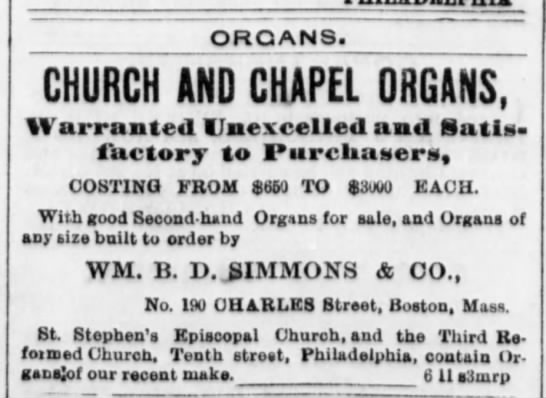
1870 - 1870 W. B. D. newspaper ad touting their St. Stephen's organ installation (Photograph from an archival source: Advertisement, submitted by Jeff Fowler/Jeff Fowler)
Note: Not extant. Not playable. (in this location)

2022-01-05 - In May 1864 the Committee reported it adopted the plans submitted by a “Mr. Simon of Boston” (William Benjamin Dearborn Simmons) for a pipe organ costing $4000. The Committee recommended that the old organ be repaired and purchased for the Burd Orphan Asylum’s chapel. The organ was of 3 manuals with a "full pedal-board". Replaced in 1907 by a large, 4 manual, electropneumatic action C.S. Haskell organ. -Paul R. Marchesano
2023-03-19 - A brief description of the 1864 W. B. D. Simmons Organ of St. Stephen’s Episcopal Church, Philadelphia written by Harry Rumrill (1867-1951), a former David D. Wood (1838-1910) student who had lessons on this instrument. Wood probably had a hand in the design of this instrument. Wood was the church’s organist for the entire life of this organ. It was replaced in 1907 by a C.S. Haskell. The following is from Rumrill’s c.1942 unpublished biography of Wood. “The old organ in St. Stephen' s Church was, like others mentioned above, cased in harmony with the church interior and was otherwise an instrument worthy of the ability of the organist (David D Wood) who graced its console for almost half a century. It was built by Simmons and McIntyre, a Boston firm, whose reputation could have rested on this instrument alone. Among the beautifully voiced stops that imparted high quality to their work was a "Tenoroon Hautbois" on the upper manual, and on the lowest manual another read stop, the “Corno di Bassetto”, much favored by Mr. Wood, also a string-toned register, the “Keraulophon” which had been invented by the eminent organ builders Gray and Davison of London, about twenty years before. Its inclusion in St. Stephen's organ evidenced the progress in organ building then taking place in our country. Many of the stop combinations were rich, and the full organ ensemble very brilliant; Mr. Wood having the rare ability to discern the many hundreds of varieties of tone at command in a good organ - a marked contrast to the general character of organ tone where the player is content to use but few of the possible combinations that lie dormant in his instrument. “ -Jeff Fowler
Regrettably, it is not possible to display the information about the sponsor of this pipeorgandatabase entry or if there is a sponsor. Please see About Sponsors on Pipe Organ Database.